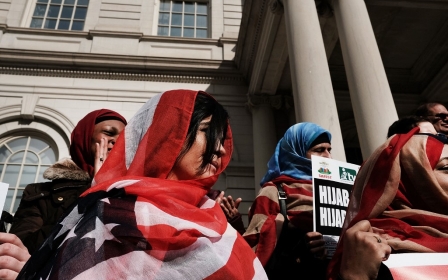How divorced Muslim women in the US are fighting for what they’re owed

Eman* was 24 years old when her husband divorced her. She described him as an abusive, manipulative man and said the only thing he ever did right was when he uttered the words "I divorce you" three times.
Both Eman’s and her now ex-husband’s families wanted them to save the marriage. For them, anything was better than a divorce - even physical abuse. Eman was told husbands hit their wives from time to time and told by her mother that it was normal and she should take it - as she was his wife. Eman eventually wanted the marriage to end, and one day her husband caved and divorced her.
Eman was all alone. Though she was back living with her family, her family was struggling. She didn’t have a degree because she got married right out of high school. It would have been fine if she had received the money from the pre-nuptial agreement signed by her ex - known as a mahr in Islam - that was owed to her. But her husband refused to give her the $25,000.
In Islam, a mahr is an obligatory pre-nuptial gift a husband must give to his wife. It can be monetary, such as cash or property, or non-monetary, which can include a husband teaching his wife chapters of the Quran. The mahr must be decided upon at the time of the nikkah (the Islamic wedding contract). The purpose of this obligatory gift is to allow the woman independence and give her financial stability.
“One, it’s meant to signify the willingness, the sincerity, of the groom to commit to the marriage,” Afraz Khan, the executive director of Muslim Wedding Service, told MEE. “But secondly, it's also meant to serve as a way to honour the bride, as it is an honour to enter into this marriage contract with her. It’s for the bride to keep right and she's entitled to all of it.”
While some scholars say it is best that the husband gives the mahr to his wife right away, some say it can be deferred, and that is quite often the case.
At a time of divorce, depending on the circumstances surrounding it, the husband must give the wife her mahr. It is something that is owed to her, according to Islam, and something that was signed, agreed upon and witnessed by both the bride, groom, and their families. In Islam, there is no concept of alimony, which is why the mahr is especially important for the woman to be able to move forward. Once the husband gives the mahr, he no longer has any responsibilities.
But women like Eman are financially on their own. Eventually, Eman decided to forget about the mahr, as she didn’t want to fight for it and thought it was better that she was no longer with her husband.
“He was not afraid of God, that is clear. It was clear from the abuse and it was clear from not honouring the Islamic contract. But he was also not afraid of the court either. I threatened him that I’d go to court, and he looked at me straight in the eyes and said, ‘Then go.’ I will always remember that,” Eman told Middle East Eye.
“It’s not only me. I have met women who have gone through the same thing. There are men who are evading both their obligations as a Muslim and their obligations as written on a signed contract. Why? Because they can.”
Why the nikkah contract is not enforceable
In the State of New York, the nikkah contract is not enforceable because it isn’t notarised - which is a requirement for a pre-nuptial agreement. When Muslim couples get married, they sign both the nikkah contract to be Islamically married and the civil contract so their marriage can be officially recognised by the state.
That’s not to say that the nikkah contract is unenforceable throughout the US. In 2019, in the Michigan court case Seifeddine v. Jaber, where the woman was owed $50,000, her mahr was actually upheld.
“... The trial court expressly and repeatedly stated that it was not applying religious principles or doctrines but was instead applying Michigan common law regarding contracts. It is abundantly clear from the record that the trial court applied Michigan common law regarding contracts and determined that each of the elements for establishing a valid contract was met,” the court document stated.
In New York, couples can choose to get their contracts notarised, though many choose not to, as they feel there isn't a need. Either way, they do get their civil contracts, but the civil contract does not include the concept of mahr.
So when women go to court, and some do, to get the mahr that is owed to them by their husbands, the court has nowhere to look. And the women are left in a bind.
'It's an ego thing'
Tasnima Mohaimin has been going through a divorce for the past year and a half. Her husband was accused of infidelity. During the divorce, he said his family took her jewellery and then claimed it was her mahr, when it was not.
Two weeks ago, Mohaimin’s husband filed a suit against Mohaimin, saying he doesn’t have to pay her because the contract was not enforceable or notarised. But this begs the question, Why?
“It’s not about ‘I can’t pay the mahr, that’s why I’m not paying it’, it’s more ‘I don’t have to pay it because New York State is saying I don’t have to’,” Mohaimin told MEE. “In my case, my husband is an anesthesiologist. Compared to his salary, this is nothing for him. It’s more of an ego thing.”
She explained that some women who are going through the same problem don’t have the funds to go to court to fight for their rights.
“Let’s say, for example, a mahr is $20,000. If you’re going to the court filing these motions and asking for a trial, it will cost you more than that. So at that point, a lot of people just let it go.”
But Mohaimin believes women shouldn’t just let it go. She believes the solution is to make the nikkah contract enforceable. And she’s doing that by fighting for a rule change in the New York State legislature, in order to enforce mahr agreements as valid, enforceable contracts.
“Something that was meant to protect women in these situations by our own religion is now being taken away. I will be fine whether I can get my mahr or not. For me, it's not about the money. I will probably end up wasting a lot more money than what my mahr is even worth, but if I can prevent one other woman from going through this whole situation, for them to get their right and stand back up on their feet, then I think it's worth it.”
Rights and obligations
In the New York court case Khan v. Hasan in 2021, a husband filed a motion for summary judgment seeking an order to hold the mahr invalid and unenforceable, and requesting counsel and expert fees. It was later ordered that his summary judgement be granted and the mahr agreement was deemed void.
'Don't just take some stock contract that the imam gives you'
- Rabea Benhalim, University of Colorado Law School
“New York courts have not specifically addressed the validity and enforceability of unacknowledged mahr agreements when all the proceedings have taken place in New York. But, even if the New York courts had adopted the ‘neutral principles of law’ approach and applied it to the parties’ mahr agreement, it still could not be upheld due to the lack of an acknowledgement,” the court document stated.
According to Jacqueline Harounian, an attorney in New York who has represented multiple women in their fights to obtain their rightful mahr, the rights of Muslim women in the past were much stronger.
"The mahr wasn’t an issue, it was already decided. We knew what it’s worth, enforceability was not in question and it really gave women significant leverage,” she said. “I have had many many cases over the years where men immediately acquiesced. Whether it was a pension or a house, or gold coins it was clear that she’d get her mahr because it was enforceable according to the religion and it was witnessed. But now, with new cases being decided that challenge the contract in New York, this is the first time where I am really concerned for the rights of my clients who are women.”
She believes that people need to start becoming aware and women need to protect themselves. She said contracts in New York should all be notarised, even if it takes going to the wedding ceremony and inviting a notary. She also suggested that the contracts be more detailed, which many of them are not.
Rabea Benhalim, an associate professor at the University of Colorado Law School, says that people should pay attention to their contracts – something most people do not do.
“Don't just take some stock contract that the imam gives you. Read it, have conversations about it, and understand what your rights and obligations are to each other,” she said.
In 2012, there was the court case Soleimani v. Soleimani in Kansas. It involved a wife’s request to enforce the mahr - worth $650,000 - contained in her nikkah contract. Eventually, the trial judge said he was prohibited from considering sharia - Islamic law - because of the anti-sharia legislation adopted in Kansas.
“In that case, there was an assumption that if they apply the sharia, that it's going to be bad for the woman,” Benhalim said. “Like the sharia must be anti-woman, and the reality of this case was that if the contract had been upheld, she would have gotten $650,000. But since the court refused to apply it, they only gave her alimony, which was very small.”
Khan explained that the rights of women were something that even Prophet Muhammad spoke about in his last sermon, when he said: “O People it is true that you have certain rights with regard to your women but they also have rights over you. Remember that you have taken them as your wives only under Allah's trust and with His permission.”
“It is unfortunate that there are husbands not honouring the fact that they’re under the permission of swearing by God, committing to this contract,” Khan said.
“It goes to show that you need a balance of both the religious requirements but also the legal recourse or backing. A lot of couples don’t think about this because it’s like why should you get something notarised if you’re both committing? But in terms of a contract, if it means protecting yourself, then you should be getting it notarised.”
Middle East Eye delivers independent and unrivalled coverage and analysis of the Middle East, North Africa and beyond. To learn more about republishing this content and the associated fees, please fill out this form. More about MEE can be found here.





